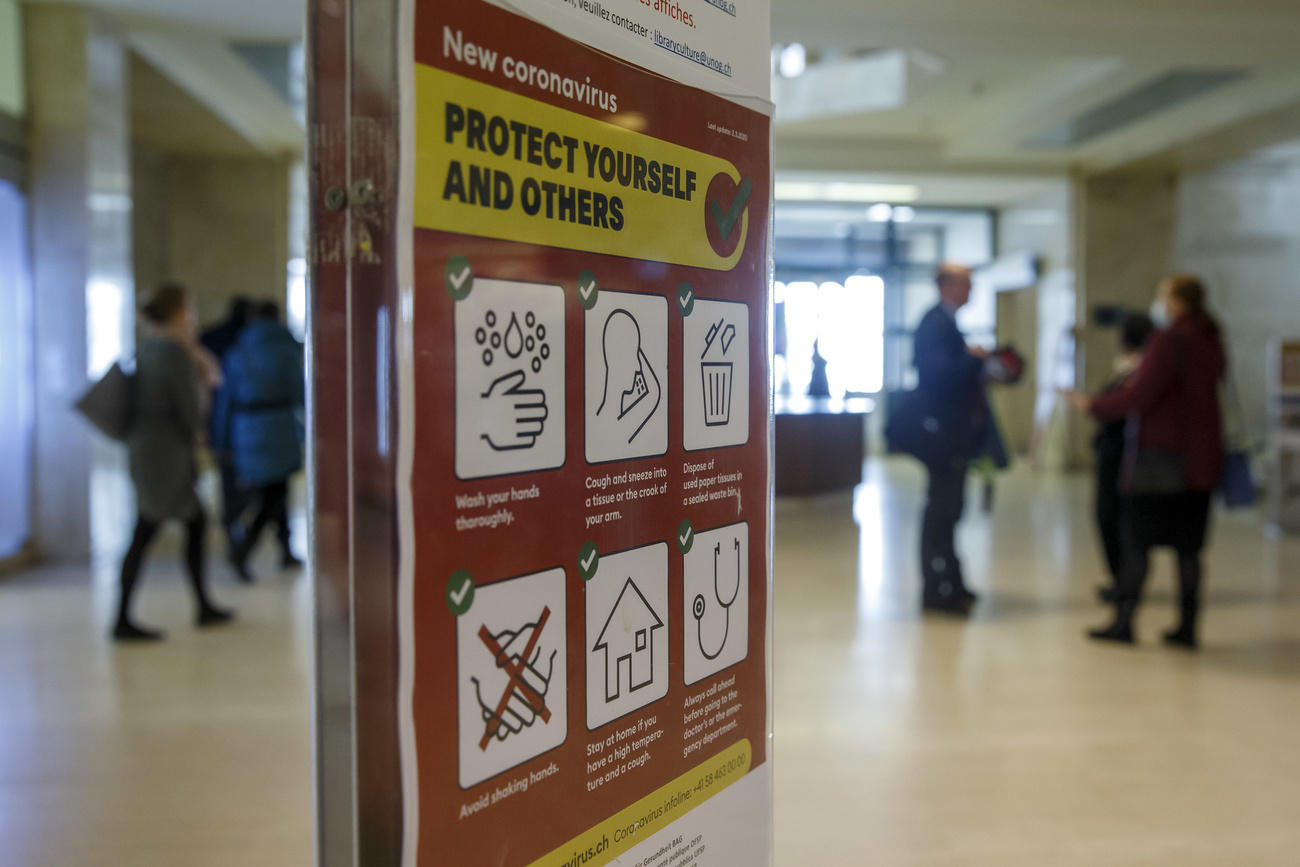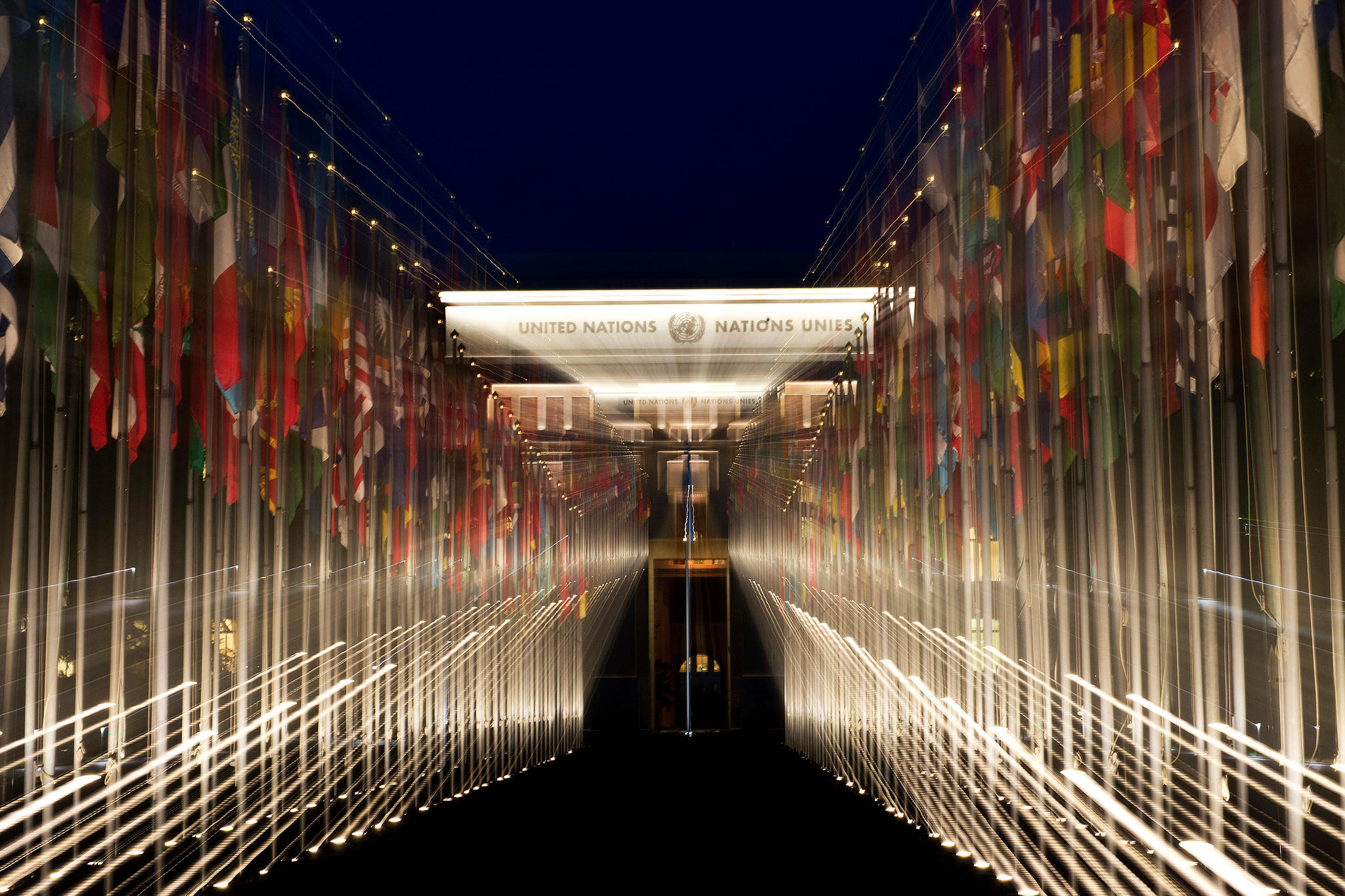‘Desperate measures in desperate times’ as virus affects International Geneva

Geneva has been at the sharp end of the disruption caused by the new coronavirus. After the motor show, the list of cancelled or postponed conferences and meetings in Switzerland’s most international city continues to grow.
While the coronavirus figures for Geneva remain relatively low – 78 confirmed cases and no deaths at the time of writing – the impact on activities in the international city, a global governance hub that claims to be the world’s biggest centre for international conferences, has been considerable.
The motor showExternal link (600,000 visitors), an inventions fairExternal link (50,000), and a human rights film festivalExternal link (40,000) were among the first local casualties of the global outbreak and Swiss ban on major events. This list has been extended with the cancellation of 200 side events at the United Nations Human Rights Council and the Geneva Brain WeekExternal link, and postponements of the Geneva Health ForumExternal link, the World Summit on the Information Society (WSIS) ForumExternal link, the AI for Good Global SummitExternal link, and the ILO Governing Body meetingExternal link, which together attract thousands of international visitors.
On March 10, World Trade Organization (WTO) Director-General Roberto Azevêdo announced External linkthat all meetings at WTO would be suspended from March 11-20. This follows confirmation that a WTO Secretariat staff member had contracted coronavirus. The International Labour Organization (ILO) said on March 12 that a probable case had also been identified at its headquarters. The staff member is staying at home to recover while areas of the HQ are being disinfected.
After confirmation of one #COVID19External link case in the WTO staff, the organization is suspending all meetings from tomorrow until 20 March.
— WTO (@wto) March 10, 2020External link
More details: https://t.co/BvByNZUN94External link pic.twitter.com/OFpyY3vGGwExternal link
The Conference on Disarmament (CD) meetings and regular debates for the 43rd session of the UN Human Rights Council (February 24-March 20) had been continuing, but on March 12 the human rights council agreed to suspend the 43rd session on Friday March 13 “until further notice”, and the CD announced the same day that its next two plenary sessions in March would be postponed. The decisions came a day after Geneva authorities tightened its rules, saying that public meetings in the Swiss city should be limited to 100 people.
Palais des Nations
In the corridors of the historic Palais des Nations, the European headquarters of the UN, work appears to go on, but there is none of the hustle-and-bustle typical for this time of year and anxiety surrounding the virus is palpable.
Public visits to the complex have been stopped. Behind the scenes, UN officials have been scrambling to set up crisis management structures, coordinate with other members of the UN system, informExternal link and reassure staff and event organisers at the Palais, and put in place contingency plans. Bottles of sanitizer are made available at meetings and organisers have been told to make sure participants do not sit closer than two metres for periods longer than 15 minutes.
“We are trying to maintain essential UN activities as much as possible,” explained Rhéal Leblanc, head of press and external relations at the UN Office in Geneva. “Everyone is trying to make alternative arrangements like using video-conferencing or remote meetings and everyone is doing risk assessments while heeding the recommendations of the Swiss authorities and World Health Organization (WHO).”

More
Coronavirus: the situation in Switzerland
Risk assessments
The ten biggest international organisations in Geneva seem to be implementing similar measures, in close collaboration with the WHO and Swiss authorities. Beyond risk evaluations, these include practical steps like setting up intranet pages and other information on preventive measures, offering guidance and updates on work and travel arrangements and “safe distancing”. The use of video-conferencing and virtual meetings has been widely encouraged, where possible, with staff in field offices working from home for periods.
The International Committee of the Red Cross (ICRC), for example, has suspended all non-essential travel until April 15. This has affected all training sessions, workshops, and seminars requiring international travel.
‘Desperate measure’
The decision to cancel 200 Human Rights Council side events organised this month by NGOs and states has affected over 1,000 participants, many travelling to Geneva from other countries.
Council spokesperson Rolando Gomez described it as a “desperate measure in desperate times”.
“It’s frustrating and not very helpful for NGOs,” a human rights activist told swissinfo.ch. “This is the main session when many people from the field come to Geneva to talk to the states. It’s important and here they’re being denied that opportunity.”

More
Diplomacy goes virtual as the coronavirus goes viral
But Gomez added that the decision had been well thought out. “It’s not just about participants in Geneva getting affected, but it’s also about potentially mitigating the risk of the virus being exported back to countries with weaker health systems,” he said.
Ensuring continuity
In the face of the coronavirus threat, the UN is not enforcing travel restrictions, instead leaving it down to individual responsibility. Participants at meetings from coronavirus-risk countries may be asked about their itinerary to Geneva but they are still allowed to attend. Leblanc said appropriate safeguards had been put in place and the global body was doing its utmost to “preserve people’s health given the circumstances”, but “we don’t have the facilities to screen people”, he added.
The International Telecommunications Union (ITU)External link, for its part, has postponed its two big upcoming meetings – the WSIS and AI for Good conferences – until later in the year. But it has advised visitors to the ITU from affected countries, or anyone having visited an affected area during the previous two weeks before attending an ITU event, that they will get their temperature checked and may be turned away. All delegates will have to provide information on places visited to help with Covid-19 tracing.
Asked about the general impact of the virus on International Geneva, Paola Ceresetti, spokesperson for the Swiss mission to the UN in Geneva, said international organisations were managing to “ensure continuity of work” while implementing measures to protect the health of staff.
“In general, in accordance with the UN secretary-general’s recommendations, meetings are taking place with Geneva-based staff and diplomats, thus limiting the travel and arrival of delegations from foreign capitals to Geneva to what is strictly necessary,” she added.
What the Swiss authorities say
Following the spread of coronavirus in Europe, on February 28 Switzerland imposed a ban on public and private events that gather more than 1,000 people together in the same place until at least March 15.
The Geneva cantonal authoritiesExternal link, in particularly the cantonal medical service, are an essential contact for international organisations, replying to multiple requests on whether to hold or cancel meetings, conferences and other events.
On March 11, the Geneva cantonal government iExternal linkntroduced tougher rules for meetings and events. Henceforth, public or private events with fewer than 1,000 but more than 100 participants are prohibited, unless the participants are seated and maintain sufficient distance between them (1.80 metres apart).
All events must be announced to the cantonal doctor’s office, who may either set additional conditions or ban them if they feel the safety guarantees are insufficient.

In compliance with the JTI standards
More: SWI swissinfo.ch certified by the Journalism Trust Initiative











You can find an overview of ongoing debates with our journalists here . Please join us!
If you want to start a conversation about a topic raised in this article or want to report factual errors, email us at english@swissinfo.ch.